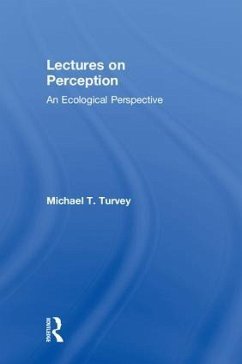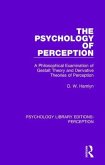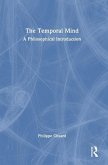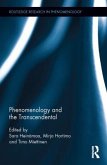- Gebundenes Buch
- Merkliste
- Auf die Merkliste
- Bewerten Bewerten
- Teilen
- Produkt teilen
- Produkterinnerung
- Produkterinnerung
This book addresses the generic principles by which each and every kind of life form-from single celled organisms to multi-celled organisms-perceives the circumstances of their living so that they can behave adaptively.
Andere Kunden interessierten sich auch für
![The Origins of Consciousness The Origins of Consciousness]() Giorgio VallortigaraThe Origins of Consciousness166,99 €
Giorgio VallortigaraThe Origins of Consciousness166,99 €![Interpreting Visual Art Interpreting Visual Art]() Catherine WeirInterpreting Visual Art181,99 €
Catherine WeirInterpreting Visual Art181,99 €![Biological and Neuroscientific Foundations of Philosophy Biological and Neuroscientific Foundations of Philosophy]() Franco FabbroBiological and Neuroscientific Foundations of Philosophy161,99 €
Franco FabbroBiological and Neuroscientific Foundations of Philosophy161,99 €![The Psychology of Perception The Psychology of Perception]() D W HamlynThe Psychology of Perception161,99 €
D W HamlynThe Psychology of Perception161,99 €![Sensation of Movement Sensation of Movement]() Sensation of Movement181,99 €
Sensation of Movement181,99 €![The Temporal Mind The Temporal Mind]() Philippe ChuardThe Temporal Mind170,99 €
Philippe ChuardThe Temporal Mind170,99 €![Phenomenology and the Transcendental Phenomenology and the Transcendental]() Phenomenology and the Transcendental190,99 €
Phenomenology and the Transcendental190,99 €-
-
-
This book addresses the generic principles by which each and every kind of life form-from single celled organisms to multi-celled organisms-perceives the circumstances of their living so that they can behave adaptively.
Hinweis: Dieser Artikel kann nur an eine deutsche Lieferadresse ausgeliefert werden.
Hinweis: Dieser Artikel kann nur an eine deutsche Lieferadresse ausgeliefert werden.
Produktdetails
- Produktdetails
- Verlag: Taylor & Francis
- Seitenzahl: 446
- Erscheinungstermin: 25. Oktober 2018
- Englisch
- Abmessung: 229mm x 152mm x 25mm
- Gewicht: 767g
- ISBN-13: 9781138335257
- ISBN-10: 1138335258
- Artikelnr.: 57056486
- Herstellerkennzeichnung
- Libri GmbH
- Europaallee 1
- 36244 Bad Hersfeld
- gpsr@libri.de
- Verlag: Taylor & Francis
- Seitenzahl: 446
- Erscheinungstermin: 25. Oktober 2018
- Englisch
- Abmessung: 229mm x 152mm x 25mm
- Gewicht: 767g
- ISBN-13: 9781138335257
- ISBN-10: 1138335258
- Artikelnr.: 57056486
- Herstellerkennzeichnung
- Libri GmbH
- Europaallee 1
- 36244 Bad Hersfeld
- gpsr@libri.de
Michael T. Turvey is Board of Trustees' Distinguished Professor of Experimental Psychology at the University of Connecticut and a Senior Scientist at Haskins Laboratories in Connecticut. He is the recipient of Guggenheim and Catell Fellowships, the American Psychological Association Early Career Award, Fellow of Society of Experimental Psychologists (SEP), Bernstein 2009 Prize in Motor Control, SEP Lifetime Achievement Award, Association for Psychological Science Lifetime Mentor Award, and two honorary doctorates.
Table of Contents
Part 1: Foundational Concepts
1. What Kinds of Systems Do We Study?
2. Organism-Environment Dualism
3. Direct Perceiving, Indirect Perceiving
4. Simulative, Projective and Locality Assumptions
5. The Mechanistic Hypothesis
6. The Cartesian Program
7. Empiricism and the Man in the Inner Room
8. The Space Enigmas I: Berkeley
9. The Space Enigmas II: Kant, the Nature of Geometry, and the Geometry
of Nature
10. The Space Enigmas III: Local Signs and Geometrical Empiricism
11. Doctrines of Sensations and Unconscious Inferences
12. The Space Enigmas. IV: On Learning Space Perception
13. Gestaltism I: Atomism, Anatomism and Mechanistic Order
14. Gestalt Theory II: Fields, Self-organization, and the Invariance
Postulate of Evolution
15. Gestalt Theory III: Experience Error, CNS Error, Psycho-neural
Isomorphism, Behavioral Environment
Part 2: Computational-Representational Perspective
16. The Computational-Representational Perspective: Preliminaries
17. Pattern Recognition and Representation Bearers
18. Turing Reductionism, Token Physicalism: The Computational System
Assumption
19. Reflections on the Physical Symbol System Hypothesis
Part 3: Ecological Perspective
20. Ecology: The Science that Reasons Why
21. Barriers to Ecological Realism
22. Ontology at the Ecological Scale
23. Ecological Optics Primer
24. Perceiving "How to Get About Among Things"
25. The Mechanical Basis for "Getting About Among Things"
26. Strong Anticipation and Direct Perception
Part 1: Foundational Concepts
1. What Kinds of Systems Do We Study?
2. Organism-Environment Dualism
3. Direct Perceiving, Indirect Perceiving
4. Simulative, Projective and Locality Assumptions
5. The Mechanistic Hypothesis
6. The Cartesian Program
7. Empiricism and the Man in the Inner Room
8. The Space Enigmas I: Berkeley
9. The Space Enigmas II: Kant, the Nature of Geometry, and the Geometry
of Nature
10. The Space Enigmas III: Local Signs and Geometrical Empiricism
11. Doctrines of Sensations and Unconscious Inferences
12. The Space Enigmas. IV: On Learning Space Perception
13. Gestaltism I: Atomism, Anatomism and Mechanistic Order
14. Gestalt Theory II: Fields, Self-organization, and the Invariance
Postulate of Evolution
15. Gestalt Theory III: Experience Error, CNS Error, Psycho-neural
Isomorphism, Behavioral Environment
Part 2: Computational-Representational Perspective
16. The Computational-Representational Perspective: Preliminaries
17. Pattern Recognition and Representation Bearers
18. Turing Reductionism, Token Physicalism: The Computational System
Assumption
19. Reflections on the Physical Symbol System Hypothesis
Part 3: Ecological Perspective
20. Ecology: The Science that Reasons Why
21. Barriers to Ecological Realism
22. Ontology at the Ecological Scale
23. Ecological Optics Primer
24. Perceiving "How to Get About Among Things"
25. The Mechanical Basis for "Getting About Among Things"
26. Strong Anticipation and Direct Perception
Table of Contents
Part 1: Foundational Concepts
1. What Kinds of Systems Do We Study?
2. Organism-Environment Dualism
3. Direct Perceiving, Indirect Perceiving
4. Simulative, Projective and Locality Assumptions
5. The Mechanistic Hypothesis
6. The Cartesian Program
7. Empiricism and the Man in the Inner Room
8. The Space Enigmas I: Berkeley
9. The Space Enigmas II: Kant, the Nature of Geometry, and the Geometry
of Nature
10. The Space Enigmas III: Local Signs and Geometrical Empiricism
11. Doctrines of Sensations and Unconscious Inferences
12. The Space Enigmas. IV: On Learning Space Perception
13. Gestaltism I: Atomism, Anatomism and Mechanistic Order
14. Gestalt Theory II: Fields, Self-organization, and the Invariance
Postulate of Evolution
15. Gestalt Theory III: Experience Error, CNS Error, Psycho-neural
Isomorphism, Behavioral Environment
Part 2: Computational-Representational Perspective
16. The Computational-Representational Perspective: Preliminaries
17. Pattern Recognition and Representation Bearers
18. Turing Reductionism, Token Physicalism: The Computational System
Assumption
19. Reflections on the Physical Symbol System Hypothesis
Part 3: Ecological Perspective
20. Ecology: The Science that Reasons Why
21. Barriers to Ecological Realism
22. Ontology at the Ecological Scale
23. Ecological Optics Primer
24. Perceiving "How to Get About Among Things"
25. The Mechanical Basis for "Getting About Among Things"
26. Strong Anticipation and Direct Perception
Part 1: Foundational Concepts
1. What Kinds of Systems Do We Study?
2. Organism-Environment Dualism
3. Direct Perceiving, Indirect Perceiving
4. Simulative, Projective and Locality Assumptions
5. The Mechanistic Hypothesis
6. The Cartesian Program
7. Empiricism and the Man in the Inner Room
8. The Space Enigmas I: Berkeley
9. The Space Enigmas II: Kant, the Nature of Geometry, and the Geometry
of Nature
10. The Space Enigmas III: Local Signs and Geometrical Empiricism
11. Doctrines of Sensations and Unconscious Inferences
12. The Space Enigmas. IV: On Learning Space Perception
13. Gestaltism I: Atomism, Anatomism and Mechanistic Order
14. Gestalt Theory II: Fields, Self-organization, and the Invariance
Postulate of Evolution
15. Gestalt Theory III: Experience Error, CNS Error, Psycho-neural
Isomorphism, Behavioral Environment
Part 2: Computational-Representational Perspective
16. The Computational-Representational Perspective: Preliminaries
17. Pattern Recognition and Representation Bearers
18. Turing Reductionism, Token Physicalism: The Computational System
Assumption
19. Reflections on the Physical Symbol System Hypothesis
Part 3: Ecological Perspective
20. Ecology: The Science that Reasons Why
21. Barriers to Ecological Realism
22. Ontology at the Ecological Scale
23. Ecological Optics Primer
24. Perceiving "How to Get About Among Things"
25. The Mechanical Basis for "Getting About Among Things"
26. Strong Anticipation and Direct Perception









